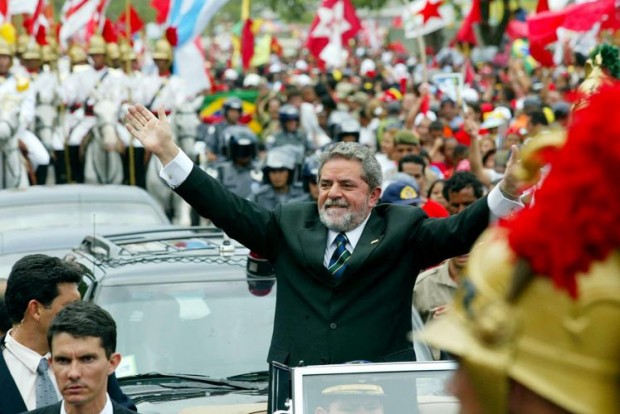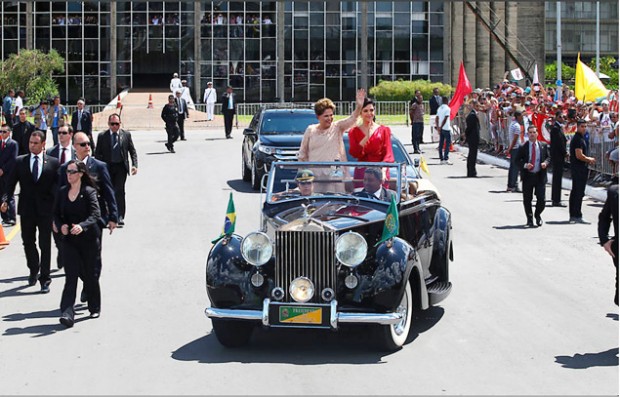By Mauricio Savarese
Brasília
If you want a sense of how difficult the beginning of President Dilma’s fourth term will be – both for her, and for Brazil – you only need to compare her inauguration to the three previous times her Workers’ Party assumed power.
In better days, Lula and Dilma managed to oversee the rise of tens of millions out of poverty. But Brazil’s workers are now facing a new phase of austerity, and after twelve years of PT power sometimes marked by corruption scandals and painful concessions to the right wing, the party’s core supporters were less thrilled than usual when Dilma took over this January.
Tax increases and spending which will hit some of the poor hard. A position of official austerity meant to regain the trust of financial markets. Less credit for consumers, especially those that want to buy new homes. These are some of the policies that newly-elected Luiz Inácio Lula de Silva was about to put into place after taking over in 2003. One month into Dilma Rousseff’s second term, which started twelve years later, she has adopted a remarkably similar set of policies. How much has the Workers’ Party (PT) changed since then? Internally, perhaps not so much, since including reactionaries and famous crooks were always part of the party’s strategy to conquer the broad center.
But the PT is now going through an identity crisis that is so pronounced that even some of its most hardcore supporters admit being depressed.
Let’s put all four inauguration ceremonies side by side. I covered all of them – two for Lula, and two for Rousseff. 2003 seems a world away, when 200,000 people invaded central Brasília. In 2015, a quiet group of 5,000 arrived, including some ‘militants’ which quietly admitted to me that were paid to be there. That is extremely embarrassing for a party that has a proud tradition of grassroots movements.
Twelve years ago, Brazilians were full of anticipation. Now, they’re just ready to face reality. “We know it isn’t going to be great four years,” one of the militants said. “But we won, we have to keep the good things that we have come up with since Lula. We have to be realistic, stop the conservatives.”
For him and many other supporters that have made the decision to support conservative politics implemented by other means, the dream is indeed over. In 2003, even Lula’s predecessor and political rival Fernando Henrique Cardoso said that he was excited to pass his job on to the former union leader. The crowds flocked to Brasilia to celebrate not only the new president, but the Worker’s Party as well. The city was electric and that enthusiasm carried through until the mensalão scandal in 2005, which toppled key members of the cabinet.
Only then did some of his supporters decide to back off a bit and hope for a return to the PT’s distant past, in which it railed against government corruption as an outsider. But Lula stayed the course. So in 2007, after the mensalão scandal, I saw much smaller group of 10,000 at Lula’s second inauguration. The crowd was smaller, but was still pretty excited. Average Brazilians in front of the presidential palace said they trusted the man to be better because it would be a more leftist administration in the four following years. Lula didn’t do quite that in his second term, but he managed the economy well enough to ultimately raise tens of millions of people out of poverty, vastly improve Brazil’s standing on the world stage, and become Brazil’s most popular president ever.

So it was comprehensible that in 2011 there were about 15,000 under heavy rain to say hello to Dilma Rousseff, the first woman elected president in Brazil’s history, and to wave a much more popular Lula goodbye (or maybe it was just see you later). Despite the scandals, there was some real excitement to put in a woman in charge that was presented as Lula’s right hand and a fantastic manager, at a moment when Brazil was celebrating its new middle class. Rousseff embodied the Worker’s Party need to rebuild the link with that very middle class by keeping growth going and fighting corruption harder.
In her first two years she managed to fire eight ministers, many due to suspicions of corruption. And although the economy wasn’t growing too quickly, she could point to her party’s impressive record on jobs and income. Her approval rating early in her first term was high. But then came the June 2013 protests and her super-popularity disappeared. With a tight election in sight, Rousseff campaigned as a guerrilla fighter, a woman that would never be lenient with misbehavior and could hold back a conservative wave in Congress. She promised a more progressive administration.
That political vision didn’t even last a month. Realpolitik reared its head very quickly. The vast majority of the appointees to Brazil’s new cabinet could often be divided into four less than appealing categories: incumbents, those credibly accused of corruption, those placed in the wrong position for their skills, or those entirely opposed to the left-progressive program she campaigned on.
After the first unpopular decisions from her peculiar set of conservative ministers came out, it was easy to understand why the old excitement had been converted to a sentiment more similar to “at least we won.” Now the once-thrilling PT seems to have two choices ahead: do some soul searching, or mean something entirely different to Brazilians than what it used to mean. That is the opinion of former São Paulo mayor Marta Suplicy, the PT’s second most prominent elected official in 2003.
At the inauguration, one supporter from the state of Pará defended a highly suspicious politician because, he said, support in Brazil’s Congress is obtained that way. But to do what, I asked. “To stay in government,” he replied, as if that would mean a progressive administration in itself. Where does he expect to be on January 1st of 2019, I ask. “Here again. To see Lula come back. Today we are fewer, but there will be 1 million people here to see him back, I am sure,” he said.
From inside the palace, a friend that works as a PR says that politicians couldn’t even imagine how gloomy the atmosphere was outside on the square. No wonder.


